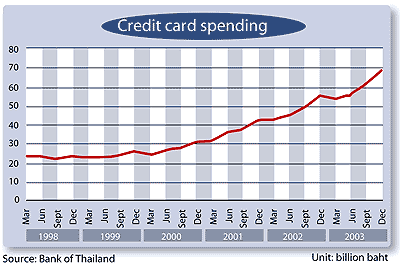One of the recurrent themes in attacks on the Thaksin government is that “populist” policies (the term often used to refer to policies that allocate resources to rural areas rather than Bangkok) have increased household debt. For example, Kasian’s important article on the political economy of the Thaksin government argues that policies such as the one million baht Village Fund have increased household debt by encouraging spending on mobile phones and “motor-scooters.” He cites data that average household debt in Thailand has increased from 70, 586 baht (5.7 times the average household monthly income) in 2000 to 84, 603 baht (6.1 times the monthly income) in 2002.
Of course, rising household debt may well be a matter for concern. But is a debt amounting to 6.1 times monthly income really so high, especially in an expanding and diversifying economy? Most people in Australia would be delighted with a household debt that amounted to only about one half of their annual income! The key issue is whether or not people can service their debt. This is an important issue that receives little attention in current debate. But there is some work being done, such as the very useful paper by the Monetary Policy Group. The data in the paper does point to some of the hazards of household debt, but it provides a much more subtle picture than the increasingly popular images of rural folk being relentlessly sucked into a vortex of debt-driven consumerism.
In the current political context is is important to ask to what extent policies such as the one million baht Village Fund have fed an increase in household debt. Perhaps not very much at all. Figure 3.1 in the Monetary Policy Group paper suggests that in 2003 the Village Fund represented less than 3 percent of household credit. And the Bangkok Post’s 2004 Mid-Year Economic Review reports that “Government policies such as the 30-baht health-care scheme, farm debt relief and the village fund programme are not seen as significant contributors to consumer loan growth since most lenders have focused on middle-income earners in urban areas.”
It may be more legimate for social commentators to focus their attention on the proliferation of credit card debt.
But credit cards are the darlings of the middle class. It is only rural debt that seems to threaten the ideals of self-sufficiency that are being deployed against Thaksin. Especially when rural folk have the cheek to purchase some of the trappings of urban modernity such as mobile phones. Outrageous!
 Facebook
Facebook  Twitter
Twitter  Soundcloud
Soundcloud  Youtube
Youtube  Rss
Rss 